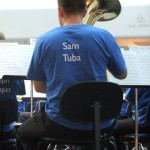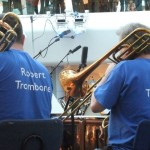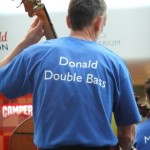by Sedgwick Clark
Shaham’s 1939 Dark Horse
Gil Shaham had an epiphany. After years of recognition as one of the brightest young lights of the concert circuit, the Israeli-American violinist conjured one of the most imaginative programming concepts in years. He had been struck by how many violin concertos written in the 1930s had entered the basic repertoire: Stravinsky (1931), Berg and Prokofiev Second (1935); then, in 1939 alone, the same year that Hollywood produced perhaps its greatest year ever, the Bartók, Hindemith, Walton, Britten, and Barber concertos. Since 2009 he has performed all of these but the Hindemith and Britten, and in December, when he received Musical America’s Instrumentalist of the Year award for 2012, he promised that he would get to those too.
But there are many other concertos on the periphery waiting to be discovered—as Dennis D. Rooney mentioned in his tribute to Shaham in the Musical America Directory—waiting for the right performer to bring them alive to a public that loves the tried and true but welcomes a little spice too. The Szymanowski Second (1932) is one; Henryk Szeryng introduced it to me at a New York Philharmonic concert nearly 40 years ago. And after four decades of over a hundred concerts a season, countless radio broadcasts, and the collection and partial deaccession of over 20,000 LPs and 10,000 CDs, I’m about to be introduced to another ’30s violin concerto at a Philharmonic concert—this time courtesy of Gil Shaham, who gave the Walton concerto such a virtuoso turn with this orchestra last spring. The work is Karl Amadeus Hartmann’s Concerto funebre (1939). Astonishingly (to me, anyway), I don’t know if I’ve ever heard a note of Hartmann’s music. Shaham will perform this concerto with the New York Philharmonic and David Zinman on March 15, 16, 17, and 20. Who knows? As with Szymanowski it may be a new love affair. I’ll let you know.
As a warmup to hearing Gil again in concert, I listened this past weekend to two Shaham CDs on his own Canary Classics label, which he founded several years ago when his previous label, Deutsche Grammophon, didn’t want to record a disc of Fauré chamber music. An all-Prokofiev disc (ATM CD 1555) includes the two violin sonatas, Opp. 80 and 94, the Five Melodies, Op. 35, and three Heifetz transcriptions sandwiched between the larger works. It’s a great CD, with the violinist contributing subtleties of dynamic shading and phrasing that elevated these works far beyond my previous estimation; he is ideally partnered by his sister, Orli Shaham. The sound, superbly produced by Eric Wen, matches the performers in its breathtaking realism. My preferred recording of the sonatas was previously the ’70s Perlman-Ashkenazy (most recently paired on an RCA CD with Perlman’s peerless recording of the Second Concerto with Leinsdorf and Boston). Henceforth, I’ll reach for the Shahams. Another superior Shaham CD on Canary is called “Virtuoso Violin Works” by Sarasate (CC07). This time Gil shares violin duties with his wife, Adele Anthony, and the pianist is Akira Eguchi. The four tracks requiring orchestral accompaniment feature the Orquesta Sinfónica de Castilla y León conducted by Alejandro Posada.
The Rest Is Noise in London
Another brilliant programming connection will dominate London’s Southbank Centre next season. It takes the subject of American music critic Alex Ross’s award-winning book The Rest Is Noise as a stepping-off point, and I quote:
“In 2007 Alex Ross wrote the seminal book The Rest Is Noise – listening to the Twentieth Century. Throughout 2013 we bring the book alive, with nearly 100 concerts, performances, films, talks and debates. We will take you on a chronological journey through the most important music of the 20th century to dramatise the massive political and social upheavals. The London Philharmonic Orchestra, with over 30 concerts, is the backbone of the festival that reveals the stories behind the rich, exhilarating and sometimes controversial compositions that have changed the way we listen forever.”
BBC Four is also involved in the project, assuring that the Foggy City will be awash in 20th-century music next season (see link).
http://www.bbc.co.uk/mediacentre/latestnews/2012/bbc-four-southbank-partnership.html
NOW, I ask you, my good friends at Lincoln Center: Here’s a concept inspired by an internationally acclaimed book by an American author, published in America (Farrar, Straus, Giroux). With all your resources and a campus made for a project of such scope, why . . . ? But that’s a hopeless query. The Brits beat us to it, and no arts org on this coast is likely to jump off the 20th-century music cliff in today’s economic climate.
A New Carlos Kleiber Bio—in ENGLISH!
Alison Ames informs me that Corresponding with Carlos: A biography of Carlos Kleiber by Charles Barber has been published by Kindle, available through Amazon for $52.69. The reader reviews, which seem astute, are raves, and two of the reviewers find the price well worth it. Here’s the link:
American readers frustrated by the existence of three bios in German may click on this link for info (they’ll still be frustrated, of course, but at least the info will be available to them):
Looking Forward
My week’s scheduled concerts:
3/15 Metropolitan Opera. Verdi: Macbeth. Gianandrea Noseda (cond.). Thomas Hampson, baritone; Nadja Michael, soprano; Dimitri Pittas, tenor ; Günther Groissböck, bass.
3/16 Avery Fisher Hall. New York Philharmonic/David Zinman; Gil Shaham, violin. Hartmann: Concerto funebre. Beethoven: Symphony Nos. 1 and 3.
3/17 Walter Reade Theater.1:30 The Callas Effect. 3:00 Callas on Film.
3/17 Alice Tully Hall. Vadim Repin, violin; Itamar Golan, piano. Janácek: Violin Sonata. Ravel: Violin Sonata. Violin Sonata No. 2. Chausson: Poème. Ravel: Tzigane.
3/18 Carnegie Hall. American Symphony Orchestra/Leon Botstein; Stephen Powell, Lori Guilbeau, Robert Chafin, Burak Bilgili, Corey Bix, soloists; Collegiate Chorale Singers. Schmidt: The Hunchback of Notre Dame (in concert).
3/21 Rockefeller University. Rachel Barton Pine, violin. Paganini: Caprices (24).


